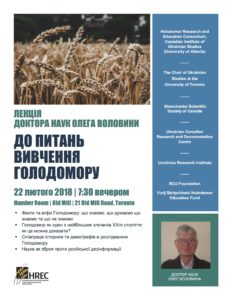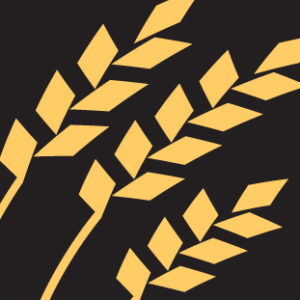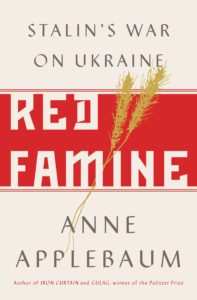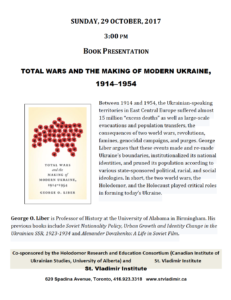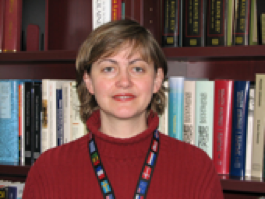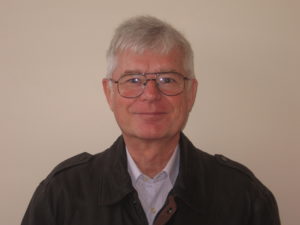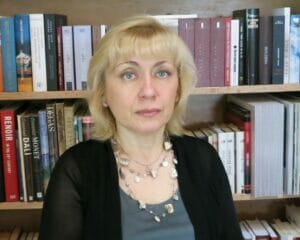Lectures and Workshops
-

Challenges in Studying the Holodomor
Oleh Wolowyna (University of North Carolina, Chapel Hill) delivered a lecture titled “Remarks on the Study of the Holodomor.” Professor Wolowyna addressed facts and myths about the Holodomor: what we know, what we think we know, and what we don’t know; the Holodomor as one of the greatest crimes of the twentieth century; collaboration of […]
Read more -

That is How I Lost My Mother: Jewish Narratives of the Ukrainian Famine 1932-33
In her lecture, Professor Shternshis discussed how Soviet Jews survived the Holodomor and how they made sense of their experiences. Shternshis, who is Al and Malka Green Associate Professor of Yiddish studies and the director of the Anne Tanenbaum Centre for Jewish Studies at the University of Toronto, based her observations on more than 200 […]
Read more -

Presentation of Red Famine: Stalin’s War on Ukraine by Anne Applebaum
Anne Applebaum, Pulitzer Prize-winning author, presented her new book Red Famine: Stalin’s War on Ukraine at the Innis Town Hall Theatre in Toronto on October 30, 2017. The discussion was moderated by Marta Baziuk (Executive Director of HREC) and introductory remarks were delivered by Dr. Frank Sysyn (University of Alberta). Red Famine: Stalin’s War on […]
Read more -

Lecture by Dr. George O. Liber on his new book Total Wars and the Making of Modern Ukraine, 1914-1954
George Liber spoke about his book Total Wars and the Making of Modern Ukraine, 1914–1954 (University of Toronto Press, 2016). Between 1914 and 1954, the Ukrainian-speaking territories in East Central Europe suffered almost 15 million “excess deaths” as well as large-scale evacuations and population transfers, the consequences of two world wars, revolutions, famines, genocidal campaigns, […]
Read more -

From the Holodomor to the Present: State Food Crimes and Possible Remedies
Rhoda Howard-Hassmann, an emeritus professor of Wilfrid Laurier University, spoke about governments that introduced policies causing malnutrition or the starvation of those for whom they were responsible. She referred to the work of legal scholar David Marcus, who coined the term “faminogenic” to describe state policies that cause or facilitate famines. She asserted that the […]
Read more -

The Holodomor and the Language of Hate in Stalinist Propaganda
Liudmyla Hrynevych, Director of the Holodomor Research and Education Centre in Kyiv and Senior Scholar at the Institute of the History of Ukraine of the National Academy of Sciences of Ukraine, discussed Soviet caricatures of Ukrainian “kulaks” and Orthodox priests as propaganda intended to engender hatred and as a contributing factor in the Holodomor. The […]
Read more -

What We Now Know about the Holodomor: New Research Results
HREC invited demographer Dr. Oleh Wolowyna to present on recent research conducted by a team of demographers from Ukraine and the US. During the well-attended lecture, Wolowyna discussed analyses of available data and recently discovered documents that put into question some popular beliefs about the Holodomor. He also discussed comparative analyses of 1932-1934 famine losses at the regional level in Ukraine […]
Read more -

Ethnic Germans in Ukraine and Their American Relatives in the Dakotas: Correspondence during the Famine of 1932–1933
The Minnesota-based researcher and writer Ron Vossler gave a lecture sponsored by CIUS’s Holodomor Research and Educational Consortium (HREC) at the University of Alberta titled “Death Scream: Ethnic Germans in Soviet Ukraine Write Their Dakota Relatives, 1932–33.” Vossler, who has studied and written on the German communities in the Dakotas, based the presentation on his […]
Read more -

A Social History of the Holodomor: Voices from Kharkiv Oblast, 1926–1934
Speaker: Dr. Olga Bertelsen, Petro Jacyk Post-Doctoral Fellow, University of Toronto This presentation focused on people’s social behavior and tactics of survival in rural areas of Kharkiv oblast, one of the regions in Ukraine most affected by the Famine of 1932–33. Prominent themes examined included: people’s behavioral transformations under hunger; survival strategies of women, men, […]
Read more -

Workshop for Early Career Scholars
HREC gathered five talented early-career scholars for two days of intense discussion at the Holodomor Workshop on June 6-7. The event allowed these scholars to present preliminary findings and to benefit from in-depth engagement with peers and established experts. Established scholars provided them with valuable guidance, both in terms of theoretical and methodological approaches, including […]
Read more
